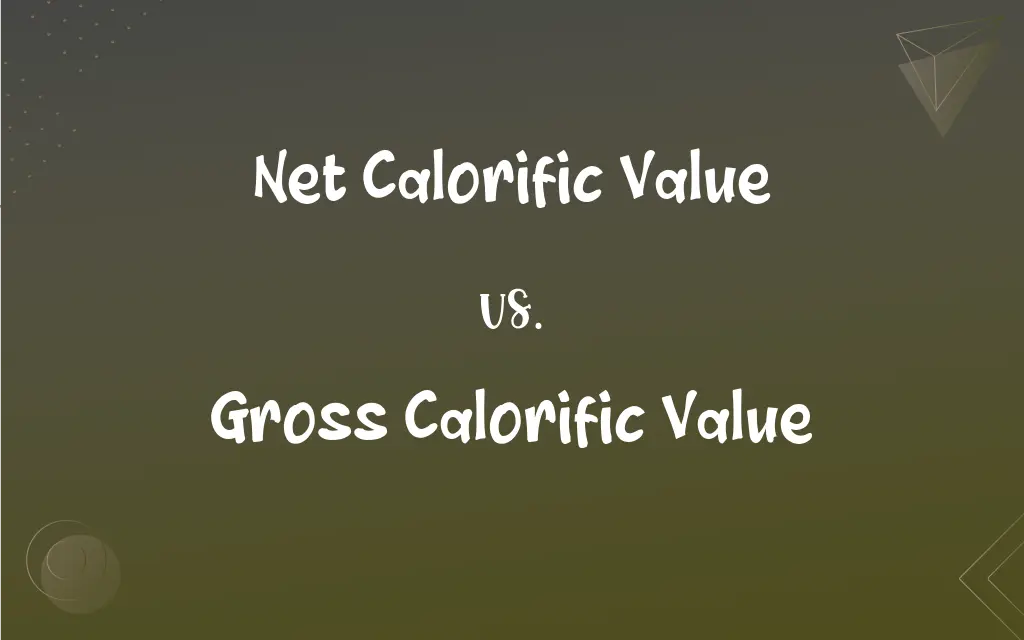Net Calorific Value vs. Gross Calorific Value: What's the Difference?
Edited by Aimie Carlson || By Harlon Moss || Published on December 15, 2023
Net Caloric Value is an energy content of a fuel after subtracting the energy used to vaporize water. Gross Caloric Value is total energy content of a fuel, including the energy of water vaporization.

Key Differences
Net Caloric Value (NCV) represents the amount of usable energy in a fuel after subtracting the energy lost in vaporizing water contained in the fuel and in the combustion products. Gross Caloric Value (GCV), in contrast, is the total energy content of the fuel, including the energy used for vaporizing water. NCV is always lower than GCV as it considers the latent heat of vaporization of water.
Gross Caloric Value is a measure of all the energy available in the fuel, while Net Caloric Value provides a more realistic figure of the actual usable energy. GCV assumes all the products of combustion, including water, are in gaseous form, whereas NCV assumes the water is condensed and the latent heat is not utilized.
In practical applications, Net Caloric Value is often more relevant as it represents the actual energy that can be harnessed for work, whereas Gross Caloric Value is useful for theoretical and comparative purposes. NCV is lower because it accounts for the energy used to evaporate water during combustion, which is not available for work.
For calculating the efficiency of fuel-burning systems, Net Caloric Value is the preferred metric. Gross Caloric Value gives an inflated value of the fuel's energy content, not reflecting the energy consumed in vaporizing water.
Gross Caloric Value is used in formulating energy content for natural gas markets, while Net Caloric Value is crucial in power generation, where water vapor is a byproduct. NCV's subtraction of water vapor's latent heat results in a more accurate representation of energy available for electricity generation.
ADVERTISEMENT
Comparison Chart
Definition
Usable energy after deducting vaporization energy
Total energy, including vaporization energy
Measurement
Lower, as it excludes water vapor energy
Higher, as it includes all energy
Relevance
Practical, for actual energy output
Theoretical, for total energy potential
Application
Used in efficiency calculations
Used in energy content formulation
Result
Provides a realistic energy value
Provides a theoretical maximum energy value
ADVERTISEMENT
Net Calorific Value and Gross Calorific Value Definitions
Net Calorific Value
Realistic energy measure excluding water vapor's energy.
Engineers use net calorific value to estimate the actual power output of fuel.
Gross Calorific Value
Total energy content of fuel, including water vaporization.
The gross calorific value of this gas indicates its high energy potential.
Net Calorific Value
Energy content of fuel after water vaporization deduction.
The net calorific value of natural gas is crucial in determining its efficiency for heating.
Gross Calorific Value
Total energy rating of fuels before practical losses.
The gross calorific value of wood chips is high, but actual usable energy is less.
Net Calorific Value
Practical energy value of fuels for work applications.
The net calorific value of coal determines its effectiveness in power plants.
Gross Calorific Value
Theoretical maximum energy yield from fuel combustion.
The gross calorific value helps compare different fuel types.
Net Calorific Value
Usable heat energy from fuel excluding latent heat of water.
The net calorific value is lower than expected due to high moisture content in the biomass.
Gross Calorific Value
Fuel’s energy capacity considering all combustion products.
Gross calorific value is critical in evaluating new energy sources.
Net Calorific Value
Fuel energy rating minus the energy of water vaporization.
The net calorific value of this biofuel makes it a viable alternative to fossil fuels.
Gross Calorific Value
Comprehensive energy measure including latent heat.
The gross calorific value is used to assess the initial quality of fuel.
FAQs
How is gross calorific value different from net calorific value?
Gross calorific value includes the total energy content of fuel, whereas net calorific value deducts the energy lost in vaporizing water.
Why is net calorific value important?
It provides a realistic measure of the actual usable energy of a fuel, crucial for efficiency calculations.
Can net calorific value be higher than gross calorific value?
No, net calorific value is always lower as it subtracts the energy for water vaporization.
In what industries is gross calorific value used?
It's used in industries for comparative energy content analysis and theoretical energy assessments.
What factors affect net calorific value?
Moisture content and the chemical composition of the fuel primarily affect it.
Can net calorific value change over time for a fuel?
Yes, factors like moisture absorption can change a fuel's net calorific value over time.
Does the measurement method impact gross calorific value?
Yes, the accuracy of measurement methods can affect the determination of gross calorific value.
What is the significance of water vapor in net calorific value?
The energy used to vaporize water is subtracted in net calorific value, affecting the usable energy output.
What is net calorific value?
Net calorific value is the usable energy of a fuel after subtracting the energy used for vaporizing water.
Is gross calorific value useful in practical applications?
It's more theoretical and is used for initial assessments and comparisons rather than practical applications.
Can renewable energy sources have a net calorific value?
Yes, renewable sources like biomass also have a net calorific value, indicating their energy efficiency.
Why do power plants focus on net calorific value?
Because it indicates the actual energy that can be harnessed for electricity generation.
Is net calorific value relevant for all types of fuels?
Yes, it's relevant for solid, liquid, and gaseous fuels in determining their usable energy.
How does gross calorific value assist in energy sector planning?
It provides an upper limit of energy potential, aiding in resource planning and management.
How is net calorific value calculated?
By deducting the energy used for water vaporization from the gross calorific value.
Are these values standardized across different countries?
Yes, there are international standards for measuring and reporting these values.
Does fuel processing affect gross calorific value?
Processing can impact moisture and chemical content, thereby affecting the gross calorific value.
How do different fuels compare in net calorific value?
Different fuels have varying net calorific values based on their moisture and chemical content.
Are there any environmental implications of these values?
Yes, understanding these values helps in choosing more efficient and environmentally friendly fuels.
Is net calorific value crucial for consumer energy choices?
Yes, it helps consumers understand the energy efficiency and cost-effectiveness of different fuel options.
About Author
Written by
Harlon MossHarlon is a seasoned quality moderator and accomplished content writer for Difference Wiki. An alumnus of the prestigious University of California, he earned his degree in Computer Science. Leveraging his academic background, Harlon brings a meticulous and informed perspective to his work, ensuring content accuracy and excellence.
Edited by
Aimie CarlsonAimie Carlson, holding a master's degree in English literature, is a fervent English language enthusiast. She lends her writing talents to Difference Wiki, a prominent website that specializes in comparisons, offering readers insightful analyses that both captivate and inform.






































































